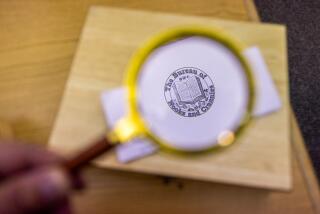Goal Is to Teach Children About Sexual Abuse : Pleasant Game Confronts Harsh Issue
- Share via
POMONA — Nancy Cowardin, an assistant professor at Cal Poly Pomona, had a problem: She needed a pleasant and memorable way to teach children the unpleasant truths about sexual abuse.
So Cowardin, who conducts graduate classes for teachers, solved the problem the way many teachers do: She made it into a game.
Called “What If,” the game looks like a variation of Monopoly. The object is to teach children the difference between “good touch” and “bad touch,” how to be assertive with suspicious adults and where to go for help.
Molested by Policeman
The 41-year-old Cowardin, herself a victim of child molestation, said she invented “What If” and four other games to give children and young adults pointers on how to avoid sexual attack.
“Children learn that authority figures don’t have the right to touch them,” Cowardin said.
Cowardin said part of the reason she invented the game was guilt associated with being molested as a 6-year-old by a policeman who lived in her neighborhood. She said the incident went unreported because such things were kept quiet at the time. She suspects that other children probably were molested by the same man. He was never charged.
“I went home and told but nothing was done,” Cowardin said. “But I still knew in my 6-year-old heart that it was wrong.”
In Cowardin’s game there are no winners or losers; players simply move their markers around the board, acting out responses and answering questions.
Cowardin said she got the idea for the game in April and asked an artist friend to draw a refined version in the hope of having it manufactured.
She Paid for Printing
She paid Oxford Printing Inc. of Whittier to manufacture 1,000 “What If” games. They are available at Vroman’s Bookstore in Pasadena and Farrel’s Educational Center in Whittier, where Cowardin lives.
A manager at Farrel’s said two of the games have been sold since they went on the shelf Aug. 9.
“There are no other games of this type available,” said Tom Olson, owner and manager of Vroman’s. “It fills the niche.”
Cowardin said she hopes to persuade other educational supply shops to carry the game but is only marketing it locally until she can gauge its potential for profit. If it is successful, Cowardin said, she may produce another version for retarded children and adults.
Among the games not yet marketed are two, geared toward adolescents and adults, that deal with rape.
Game About Rape
One game, also played on a board, presents facts about rape and suggestions on how to subdue attackers. The other is a puzzle with responses written on pieces that depict such situations as “date rape,” Cowardin’s term for forced sex on a teen-age outing.
In “What If,” the player travels along a path of brightly colored squares. A roll of the dice determines which of three types of spaces a player lands on: “Be assertive” squares, “question” card spaces and “what if” card spaces.
The “be assertive” squares have instructions like “Yell ‘No!’ ” to get children used to being forceful. Cowardin said children she has watched playing the game delight in acting out the responses.
On the “what if” spaces, the player must draw a card with a question about a specific situation. Most answers are left up to the parent or teacher supervising the game.
‘What Is Bad Touch?’
“What if someone wants you to take your clothes off for no good reason?” asks one card. Many of the “what-if cards,” Cowardin said, are designed to encourage discussion among the players.
The question cards ask for specific definitions and solutions, some of which correspond to answers in the game’s list of rules. For example, “What is bad touch?” The answer: “Bad touch is touch which hurts you and makes you feel bad.”
“It’s open for the family to impose its own values on these questions,” Cowardin said. “It takes parent and teacher guidance to validate correct answers and to add to incomplete ones.”
The game, which costs about $9, is meant to be played by 4- to 10-year-olds in the classroom and at home. Cowardin, who received her Ph.D. in educational psychology from UCLA last year and has spent the last five years instructing teachers, says the game has an advantage over films, lectures, heart-to-heart talks and other methods adults use to caution children about molestation.
‘Power, Rights, Options’
“This can be played several times,” Cowardin said. “Every time they play it reinforces the idea that they have control, power, rights and options.”
Cowardin said she occasionally uses the game in her teacher preparation classes, although it is not an established part of the Cal Poly education department’s curriculum.
Her 4-year-old son and his friends have played the game and appear to enjoy it, she said.
Several teachers who played it at a recent Cal Poly weekend seminar conducted by Cowardin on sexual abuse said they thought the game was an effective learning tool.
“This will make professionals more aware of child abuse,” said Rose Ann Steiner, an elementary teacher in the El Rancho Unified School District in Pico Rivera. “Hopefully students will feel free to talk about it. Before, it was a closet issue.”
More to Read
Sign up for Essential California
The most important California stories and recommendations in your inbox every morning.
You may occasionally receive promotional content from the Los Angeles Times.













